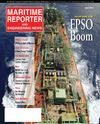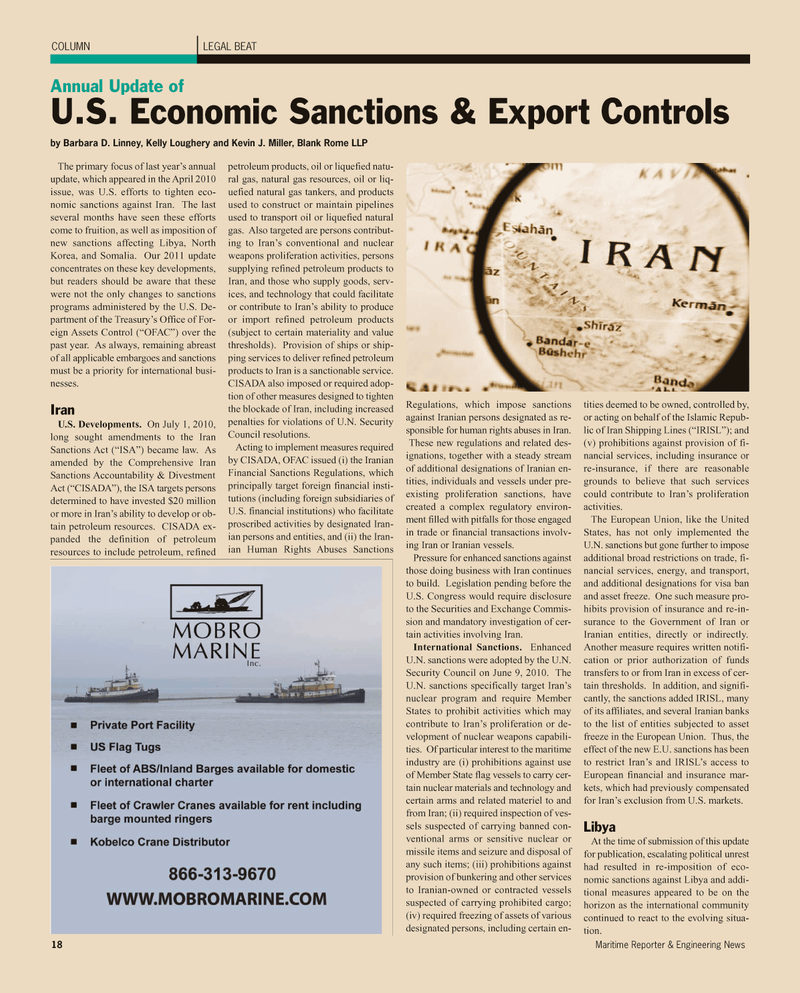
Page 18: of Maritime Reporter Magazine (April 2011)
Offshore Annual
Read this page in Pdf, Flash or Html5 edition of April 2011 Maritime Reporter Magazine
The primary focus of last year’s annual update, which appeared in the April 2010 issue, was U.S. efforts to tighten eco- nomic sanctions against Iran. The last several months have seen these efforts come to fruition, as well as imposition of new sanctions affecting Libya, North
Korea, and Somalia. Our 2011 update concentrates on these key developments, but readers should be aware that these were not the only changes to sanctions programs administered by the U.S. De- partment of the Treasury’s Office of For- eign Assets Control (“OFAC”) over the past year. As always, remaining abreast of all applicable embargoes and sanctions must be a priority for international busi- nesses.
Iran
U.S. Developments. On July 1, 2010, long sought amendments to the Iran
Sanctions Act (“ISA”) became law. As amended by the Comprehensive Iran
Sanctions Accountability & Divestment
Act (“CISADA”), the ISA targets persons determined to have invested $20 million or more in Iran’s ability to develop or ob- tain petroleum resources. CISADA ex- panded the definition of petroleum resources to include petroleum, refined petroleum products, oil or liquefied natu- ral gas, natural gas resources, oil or liq- uefied natural gas tankers, and products used to construct or maintain pipelines used to transport oil or liquefied natural gas. Also targeted are persons contribut- ing to Iran’s conventional and nuclear weapons proliferation activities, persons supplying refined petroleum products to
Iran, and those who supply goods, serv- ices, and technology that could facilitate or contribute to Iran’s ability to produce or import refined petroleum products (subject to certain materiality and value thresholds). Provision of ships or ship- ping services to deliver refined petroleum products to Iran is a sanctionable service.
CISADA also imposed or required adop- tion of other measures designed to tighten the blockade of Iran, including increased penalties for violations of U.N. Security
Council resolutions.
Acting to implement measures required by CISADA, OFAC issued (i) the Iranian
Financial Sanctions Regulations, which principally target foreign financial insti- tutions (including foreign subsidiaries of
U.S. financial institutions) who facilitate proscribed activities by designated Iran- ian persons and entities, and (ii) the Iran- ian Human Rights Abuses Sanctions
Regulations, which impose sanctions against Iranian persons designated as re- sponsible for human rights abuses in Iran.
These new regulations and related des- ignations, together with a steady stream of additional designations of Iranian en- tities, individuals and vessels under pre- existing proliferation sanctions, have created a complex regulatory environ- ment filled with pitfalls for those engaged in trade or financial transactions involv- ing Iran or Iranian vessels.
Pressure for enhanced sanctions against those doing business with Iran continues to build. Legislation pending before the
U.S. Congress would require disclosure to the Securities and Exchange Commis- sion and mandatory investigation of cer- tain activities involving Iran.
International Sanctions. Enhanced
U.N. sanctions were adopted by the U.N.
Security Council on June 9, 2010. The
U.N. sanctions specifically target Iran’s nuclear program and require Member
States to prohibit activities which may contribute to Iran’s proliferation or de- velopment of nuclear weapons capabili- ties. Of particular interest to the maritime industry are (i) prohibitions against use of Member State flag vessels to carry cer- tain nuclear materials and technology and certain arms and related materiel to and from Iran; (ii) required inspection of ves- sels suspected of carrying banned con- ventional arms or sensitive nuclear or missile items and seizure and disposal of any such items; (iii) prohibitions against provision of bunkering and other services to Iranian-owned or contracted vessels suspected of carrying prohibited cargo; (iv) required freezing of assets of various designated persons, including certain en- tities deemed to be owned, controlled by, or acting on behalf of the Islamic Repub- lic of Iran Shipping Lines (“IRISL”); and (v) prohibitions against provision of fi- nancial services, including insurance or re-insurance, if there are reasonable grounds to believe that such services could contribute to Iran’s proliferation activities.
The European Union, like the United
States, has not only implemented the
U.N. sanctions but gone further to impose additional broad restrictions on trade, fi- nancial services, energy, and transport, and additional designations for visa ban and asset freeze. One such measure pro- hibits provision of insurance and re-in- surance to the Government of Iran or
Iranian entities, directly or indirectly.
Another measure requires written notifi- cation or prior authorization of funds transfers to or from Iran in excess of cer- tain thresholds. In addition, and signifi- cantly, the sanctions added IRISL, many of its affiliates, and several Iranian banks to the list of entities subjected to asset freeze in the European Union. Thus, the effect of the new E.U. sanctions has been to restrict Iran’s and IRISL’s access to
European financial and insurance mar- kets, which had previously compensated for Iran’s exclusion from U.S. markets.
Libya
At the time of submission of this update for publication, escalating political unrest had resulted in re-imposition of eco- nomic sanctions against Libya and addi- tional measures appeared to be on the horizon as the international community continued to react to the evolving situa- tion. 18 Maritime Reporter & Engineering News
COLUMN LEGAL BEAT
Annual Update of
U.S. Economic Sanctions & Export Controls by Barbara D. Linney, Kelly Loughery and Kevin J. Miller, Blank Rome LLP

 17
17

 19
19
